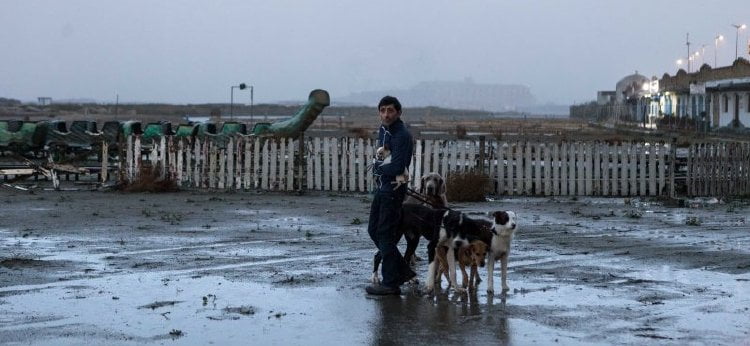Dogman

Marcello (Marcello Fonte) is the diminutive owner of a dog grooming business and the father of his pride and joy, his daughter, Alida (Alida Baldari Calabria). But, his so-called friend Simone (Edoardo Pesce), a violent brute twice Marcello’s size, forces him to do bad deeds that land him in prison in “Dogman.”
Laura's Review: B
In the same depressing landscape where his “Gomorrah” exposed the effect of crime on the common citizen and the petty thugs seduced by it, cowriter/director Matteo Garrone (“Reality”) finds Marcello (Marcello Fonte), a simple man who adores his young daughter Alida (Alida Baldari Calabria) and the dogs he grooms for a living. Marcello supplements his income with low level drug dealing and is frequently bullied by more criminal locals into assisting with their crimes, but when his long time friend, the local neighborhood savage Simoncino (Edoardo Pesce) most would be happy to put down, asks to use his shop to rob its neighbor, the dual betrayal sets a sorry path for the “Dogman.” Garrone’s achieved perfect casting here, Fonte having the face of a vintage Al Hirschfeld caricature, Pesce a simplistic, towering brute. But his film’s themes don’t come through with the same assurance as prior films, Marcello’s psychology difficult to accept. It seems like everyone in Caserta has their hands in some kind of criminality, an early after work gathering outside a local taverna featuring a discussion of how to ‘get rid of’ Simon (Marcello looks mildly alarmed as he continues eating). Marcello is treated by his fellow business owners almost like some kind of mascot, but one who’s taken advantage of. He doesn’t even make it home before he’s been hijacked to drive the getaway truck for a robbery, having to return to the scene of the crime when he learns that one of his ‘friends’ stuffed the target’s Chihuahua into the freezer. It is the relationship with Simon that is the most perplexing. Simon never treats the man well, using him to attain drugs, benefitting from Marcello’s diplomacy when he causes trouble. When Marcello refuses to allow him to break a hole through his wall to rob the gold reseller next door, Simon goes ahead and does it anyway. Marcello takes the rap, refusing to name his friend. He takes worse when he’s released, now a pariah in his own neighborhood. Meanwhile Simon’s roaring about town on a new motorbike. Marcello demands his share. Simon scoffs at him. So why is Simon looking to benefit from an act which he was wholly against via a deal we never witnessed? Marcello eventually gets his revenge and it is brutal, the work of a long abused dog turning on its master. Ironically he sees himself as a hero when he is likely to be regarded as anything but. The film closes, the man surrounded by his beloved dogs, yes, but now if a far uglier place than when we found him. Still, despite some psychology that just doesn’t add up, “Dogman” is a compelling character study, artfully crafted. The parade of dogs on display features everything from the tiniest yapper to a stoic Great Dane. Grade:
Robin's Review: B
It may not be a valid reaction as I watched “Dogman’s” story unfold, but I had a strong feeling that writer-director Matteo Garrone had read John Steinbeck’s Of Mice and Men. I feel that he used the novella’s Lenny and George characters as the template for Marcello and Simone – but with a huge twist. The gentle, timid Marcello wants nothing more than to spend time with Alida and take care of the neighborhood’s dogs. Simone, an ex-boxer who uses his brutishness to intimidate everyone in town, forces his way into Marcello’s shop, demanding cocaine and refusing to leave, despite Alida being there. This abusive behavior, we learn, is the norm for Simone and something that the meek Marcello has suffered through for years. Simone’s abuse and demands on Marcello do not stop and the bully forces his smaller “friend” into being the lookout for robbery. This crime leads the greedy and dastardly Simone to force him to be an accomplice in an even bigger crime, leading to Marcello’s arrest and imprisonment for his misguided loyalty. When released, he is a changed man and, finally, the worm turns on his tormentor. In Steinbeck’s story, George is the small, cunning one and Lenny is large, powerful and gentle. Garrone takes these two characters and deconstructs their innocence, especially Lenny’s, turning the relationship into one darker, more sinister and violent. You feel real empathy for Marcello and just as real hate for Simone and this is what the director wants us to feel.

